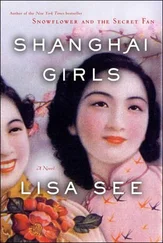Lisa See - Peony in Love
Здесь есть возможность читать онлайн «Lisa See - Peony in Love» весь текст электронной книги совершенно бесплатно (целиком полную версию без сокращений). В некоторых случаях можно слушать аудио, скачать через торрент в формате fb2 и присутствует краткое содержание. Жанр: Старинная литература, на английском языке. Описание произведения, (предисловие) а так же отзывы посетителей доступны на портале библиотеки ЛибКат.
- Название:Peony in Love
- Автор:
- Жанр:
- Год:неизвестен
- ISBN:нет данных
- Рейтинг книги:4 / 5. Голосов: 1
-
Избранное:Добавить в избранное
- Отзывы:
-
Ваша оценка:
- 80
- 1
- 2
- 3
- 4
- 5
Peony in Love: краткое содержание, описание и аннотация
Предлагаем к чтению аннотацию, описание, краткое содержание или предисловие (зависит от того, что написал сам автор книги «Peony in Love»). Если вы не нашли необходимую информацию о книге — напишите в комментариях, мы постараемся отыскать её.
Peony in Love — читать онлайн бесплатно полную книгу (весь текст) целиком
Ниже представлен текст книги, разбитый по страницам. Система сохранения места последней прочитанной страницы, позволяет с удобством читать онлайн бесплатно книгу «Peony in Love», без необходимости каждый раз заново искать на чём Вы остановились. Поставьте закладку, и сможете в любой момент перейти на страницу, на которой закончили чтение.
Интервал:
Закладка:
Mama cleared her throat. A few women looked in her direction, but otherwise the tittering agitation continued. She cleared her throat again, tapped her fingernail on a table, and began to speak in a melodious voice.
“One day the Kitchen God’s seven daughters were bathing in a pond when a Cowherd and his water buffalo came upon them.”
( 7 )
At the recognition of the opening lines to every girl and woman’s favorite story, quiet fell over the room. I nodded at my mother, acknowledg-ing how clever she was to use this story to relax us, and we listened to her recount how the impudent Cowherd stole the clothes of the loveliest daughter, the Weaving Maid, leaving her to languish naked in the pond.
“As the chill of night settled in the forest,” Mama explained, “she had no choice but to go in nature’s full embarrassment to the Cowherd’s home to retrieve her clothes. The Weaving Maid knew she could save her reputation only one way. She decided to marry the Cowherd. What do you suppose happened next?”
“They fell in love,” Tan Ze, Madame Tan’s daughter, piped up in a shrill voice.
This was the unforeseen part of the story, since no one expected an immortal to love an ordinary man when even here in the mortal world husbands and wives in arranged marriages often did not find love.
“They had many children,” Ze went on. “Everyone was happy.”
“Until?” my mother asked, this time looking for a response from another girl.
“Until the gods and goddesses grew weary,” Ze answered again, ignoring my mother’s obvious wishes. “They missed the girl who spun cloud silk into cloth for their clothes and they wanted her back.”
My mother frowned. This Tan Ze had forgotten herself entirely! I guessed her to be about nine years old. I glanced at her feet, remembering that she’d walked in unassisted today. Her two-year footbinding was behind her. Maybe her enthusiasm had to do with being able to walk again.
But her manners!
“Go on,” Ze said. “Tell us more!”
Mama winced and then continued as though yet another breach of the Four Virtues had not occurred. “The Queen of Heaven brought the Weaving Maid and the Cowherd back to the celestial skies, and then she took a hairpin and drew the Milky Way to separate them. In this way, the Weaving Maid would not be diverted from her work, and the Queen of Heaven would be beautifully robed. On Double Seven, the goddess allows all the magpies on earth to form a celestial bridge with their wings so the two lovers can meet. Three nights from now, if you girls are still awake between the hours of midnight and dawn and find yourselves sitting beneath a grape arbor under the quarter moon, you will hear the lovers weep at their parting.”
( 8 )
It was a romantic thought—and it coated us in warm feelings—but none of us would be alone under a grape arbor at that time of night, even if we were within the safety of this compound. And at least for me, it did little to still my quivering excitement about The Peony Pavilion. How much longer would I have to wait?
When it came time for dinner back in the Spring Pavilion, the women gathered in little groups—sisters with sisters, cousins with cousins—but Madame Tan and her daughter were strangers here. Ze plopped down beside me at the unmarried girls’ table as though she were soon to be married and not still a little girl. I knew it would make Mama happy if I gave my attention to our guest, but I was sorry I did.
“My father can buy me anything I want,” Ze crowed, telling me and everyone else who could hear that her family had more wealth than the Chen clan.
we had bare ly finished our meal when from outside came the sound of a drum and cymbals, calling us to the garden. I wanted to show my refinement and leave the room slowly, but I was first out the door. Lanterns flickered as I followed the corridor from the Spring Pavilion, along the edge of the central pond, to just past our Always-Pleasant Pavilion. I stepped through moon gates, which borrowed views of stands of bamboo, potted cymbidiums, and artfully trimmed branches on the other side. As the music grew louder, I forced myself to slow down. I needed to proceed cautiously, fully aware that men who were not family members stood within our walls tonight. If one of them should chance to see me, I would be blamed and a bad mark set against my character. But being careful and not rushing took more self-control than I thought possible. The opera would begin shortly, and I wanted to experience every second of it.
I reached the area that had been set aside for women and sat down on a cushion positioned near one of the screen’s folds so I could peek through the crack. I wouldn’t be able to see much of the opera, but it was more than I’d hoped for. The other women and girls came in behind me and took places on other cushions. I was so excited I didn’t even mind when Tan Ze sat beside me.
For weeks, my father—as director of the performance—had been tucked away in a side hall with the cast. He had hired a traveling all-male theatrical troupe of eight members, which had upset my mother terribly, ( 9 )
because these were people of the lowest and basest class. He’d also coerced others from our household staff—including Willow and several other servants—into taking various roles.
“Your opera has fifty-five scenes and four hundred and three arias!”
Willow had said to me in awe one day, as if I didn’t already know that. It would have taken more than twenty hours to perform the whole opera, but no matter how many times I asked, she wouldn’t tell me which scenes Baba had cut. “Your father wants it to be a surprise,” Willow said, enjoying the opportunity to disobey me. As the rehearsals became more demand-ing, consternation had rippled throughout the household when an uncle had called for a pipe and found no one to fill it, or an aunt had asked for hot water for her bath and no one had brought it. Even I had been incon-venienced, since Willow was busy now, having been given the important role of Spring Fragrance, the main character’s servant.
The music began. The narrator stepped out and gave a quick synopsis of the play, emphasizing how longing had lasted through three incarnations before Liu Mengmei and Du Liniang realized their love. Then we met the young hero, an impoverished scholar who had to leave his ancestral home to take the imperial exams. His family name was Liu, which means willow. He recalled how he dreamed of a beautiful maiden standing under a plum tree. When he woke up, he took the given name Mengmei, Dream of Plum. The plum tree, with its lush foliage and ripening fruit, brought to mind the forces of nature, so this name was suggestive even to me of Mengmei’s passionate nature. I listened attentively, but my heart had always been with Liniang and I could hardly wait to see her.
She arrived onstage for the scene called Admonishing the Daughter.
She wore a robe of golden silk with red embroidery. From her headdress rose fluffy balls of spun silk, beaded butterflies, and flowers that quivered when she moved.
“We treasure our daughter like a pearl,” Madame Du sang to her husband, but she chastised her daughter. “ You don’t want to be ignorant, do you? ”
And Prefect Du, Liniang’s father, added, “No virtuous and eligible young lady should fail to be educated. Take time from your embroidery and read the books on the shelves.”
But admonitions alone couldn’t change Liniang’s behavior, so soon enough she and Spring Fragrance were being tutored by a strict teacher.
The lessons were tedious, full of the kind of memorization of rules that I knew only too well. “It is proper for a daughter at first cockcrow to wash her hands, ( 1 0 )
Читать дальшеИнтервал:
Закладка:
Похожие книги на «Peony in Love»
Представляем Вашему вниманию похожие книги на «Peony in Love» списком для выбора. Мы отобрали схожую по названию и смыслу литературу в надежде предоставить читателям больше вариантов отыскать новые, интересные, ещё непрочитанные произведения.
Обсуждение, отзывы о книге «Peony in Love» и просто собственные мнения читателей. Оставьте ваши комментарии, напишите, что Вы думаете о произведении, его смысле или главных героях. Укажите что конкретно понравилось, а что нет, и почему Вы так считаете.












